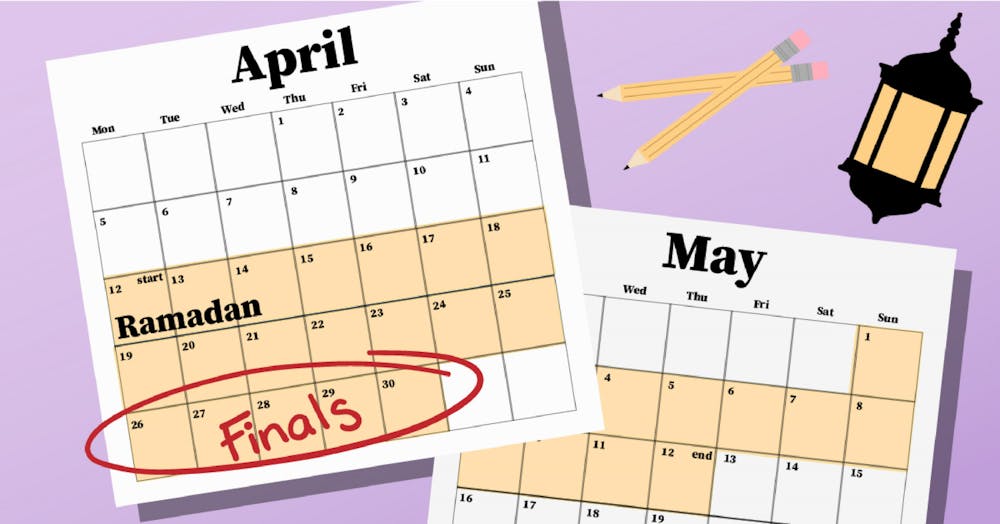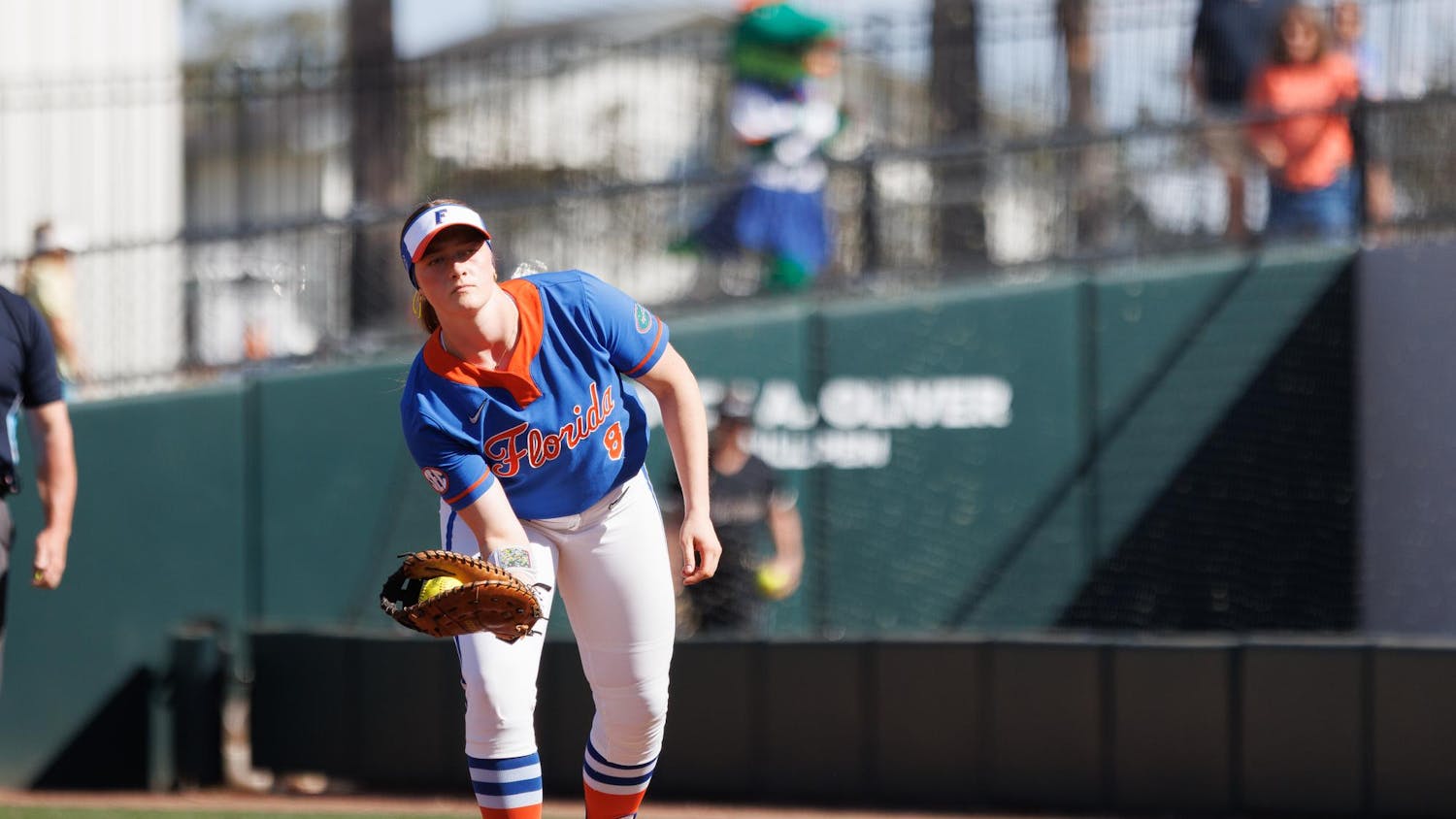Mahian Chowbhury joins billions of Muslims around the world to fast for a month each year in observance of Ramadan as a way to focus on humility, religion and self-control.
Ramadan is the ninth month of the lunar Islamic calendar, in which every month begins with a new moon. Muslims who observe Ramadan fast from dawn to sunset every day of the month, eating one meal before dawn and another after sunset.
But this year, the 18-year-old UF health science freshman is concerned about balancing his fast with finals. The holiday begins Apr. 12 and ends May 12, meaning it overlaps with UF’s finals week Apr. 29-30.
Chowbhury is taking Chemistry 1 and Biology 1 — both of which hold their exams at night, usually after sunset. This means he won’t be able to break his fast before his exam.
“It’s going to be tough to balance and find the time for both of those things,” he said. “We can’t eat because we have to take our tests, and we’ll be starving and dehydrated for the entire day.”
Fasting while studying means Chowbhury will be drained of energy during the exam, he said, likely leading to poorer performance — especially if his exams are at night. Because he is a premedical student, Chowbhury said there’s no room for error when it comes to his academics, and it’s discouraging that his final grade could be jeopardized because of the conflict with Ramadan.
In a January administrative memo, Provost and Senior Vice President for Academic Affairs Joseph Glover addressed UF’s religious observances policies.
Glover said students and faculty must share the responsibility of religious observance: students should inform their professors of their religious holidays, and professors must accommodate those holidays. This includes excused absences from class and “a reasonable amount of time” to make up missing assignments and material.
If a faculty member is aware of a religious event that impacts a “significant number” of students, they shouldn’t schedule major academic requirements on those days. However, because UF isn’t able to adjust its schedule for all religious observances, Glover said, individual students must reach out for accommodations.
But Muslim students aren’t the only ones feeling overlooked by the university during their religious holidays.
Emma Heck, an 18-year-old UF health science freshman, said she also felt let down by UF’s treatment of religious holidays when last semester’s finals conflicted with Hanukkah.
When Heck found out UF’s delayed start to the Fall 2020 semester shifted finals to occur during Hanukkah, she was extremely disappointed.
“I could go to Target and get a menorah and feel special and all, but that’s not the same as being at home with your family and actually being able to fully observe the holiday,” she said.
Heck said she wants the university to acknowledge religious minorities, even with something as simple as sending a message to professors informing them of upcoming religious holidays.
Tasnim Thakur, a 21-year-old UF business junior, echoed that sentiment.
About 1.8 billion people in the world are Muslim, 3.45 million of which live in the United States, according to Pew Research Center. Despite Islam’s status as a major world religion, Islamic holidays aren’t recognized with the same significance often allotted to religions like Christianity and Judaism, said Thakur.
“Islam is a huge major religion,” she said. “So, the fact that our holidays aren’t recognized with the same significance as those Christian holidays is definitely something I’ve faced my entire life.”
When she reached out to instructors about missing classes for religious holidays in the past, Thakur said they were understanding. Despite the accommodations, she wishes instructors were more aware of Islamic holidays — especially Eid Al-Fitr, which concludes the month of Ramadan, and Eid Al-Adha, which marks the conclusion of pilgrimage rites, when Muslims from around the world travel to Mecca in Saudia Arabia.
Since the Islamic calendar is lunar, the dates shift every year, which means Eid Al-Adha can also land during the academic year.
“Those are the two most significant and celebrated holidays in our religion,” she said. “For us, for Muslims, it’s always us reaching out to the professor, not the professor being proactive like with major religious holidays in other big religions.”
Although she doesn’t strictly follow all of the religious aspects of Islam, Thakur said her religion has always been a major part of her life since childhood, providing security, comfort and moral principles.
“When my mom would read us bedtime stories, she would read us stories about the Prophet,” she said, referring to Islam’s founder, Prophet Muhammad. “My religion has been my life since the very beginning. I never really felt like I needed to make time for it because it was always there.”
When she started fasting for Ramadan in elementary school, her mother taught her to start by fasting half of the day, then the majority of the day. Once she became comfortable with that, she started fasting full days non-consecutively.
Eventually, after she reached middle school, Thakur began fasting for the whole month. But once she reached high school, Ramadan overlapped with the end of the school year.
“It definitely has been an adjustment trying to fast while classes are going on,” she said.
Her concentration usually wanes at about 4 p.m. or 5 p.m. during Ramadan due to the lack of food and water, Thakur said. She worries this will be especially difficult this year because one of her final exams lasts from 5:30 p.m. to 7:30 p.m. — right on the cusp of sunset.
She plans to reach out to her professor about changing the exam date. If that’s not possible, she would abstain from fasting the day of the exam.
“I would rather do well on the exam than force myself to fast and not do well on it,” she said.
Contact Sofia Echeverry at secheverry@alligator.org. Follow her on Twitter @sofecheverry.

Sofia is a news assistant on The Alligator's university desk. This is her second semester at paper, where she previously worked as a translator for El Caimán.






